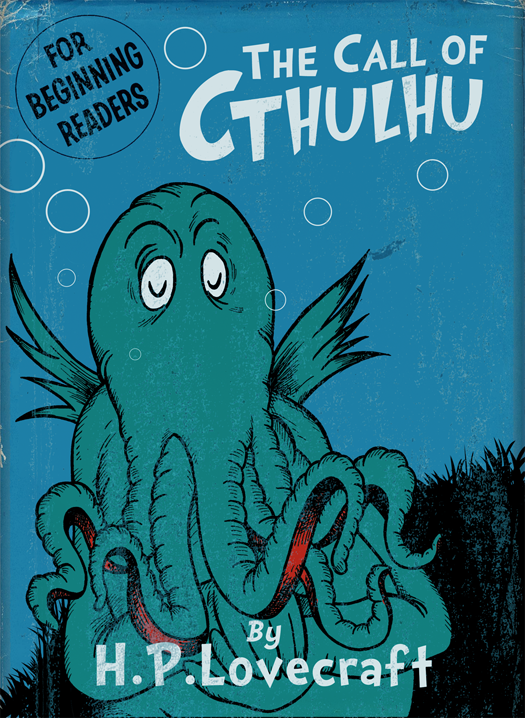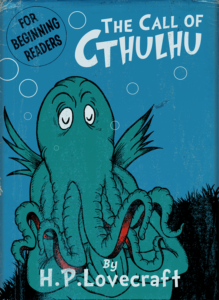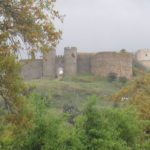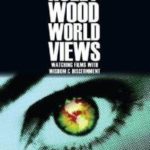Holy Terror
Today, I’d like to toss a recent article from Christianity Today onto the table for discussion. It deals with horror, a speculative genre we don’t frequently chat about here, though there are horror elements in a lot of the science fiction and fantasy stories we do talk about. Pay particular attention to the contrast between the worldviews of two paragons of classic horror, H.P. Lovecraft and Arthur Machen.
http://www.christianitytoday.com/ct/2012/october-web-only/meaning-to-madness.html?start=1
I don’t read much horror. I have to be in a certain mood for it. I used to hold the opinion that Christian horror was a contradiction in terms, but as I began to consider it more carefully and read some scholarly analysis of the genre, I began to see some virtues in its basic principles that can line up with a Christian worldview, if the story’s handled properly.
Horror usually involves a direct, unambiguous confrontation between good and evil, which are clearly delineated. Evil is not some nebulous attribution of archaic social values, something that wouldn’t seem so bad if we only took the time to understand it better. Evil wants to kill you dead, dead, dead and then watch the world burn, burn, burn.
Most classic horror portrays good as superior to evil, though evil may win a few battles while good is getting its act together, and stories may end with a subtle, or not-so-subtle, reminder that vanquished evil will likely return to try again in another form or via another avenue of approach. There’s a trend in modern works of horror that springs from a more pessimistic view of the universe, and that’s covered at some length in the article. It’s also the crux of the contrast between Lovecraft and Machen. In Lovecraft’s stories, evil is overwhelmingly powerful and utterly alien—and its chief horror is our powerlessness to resist it. Machen’s view is that a confrontation with the reality of evil engenders a “holy terror” that inspires man to turn to God, the ultimate power and our only hope of rescue.
Siding with the forces of evil has consequences. Horrifying consequences. Horror is perhaps the most conventionally moral genre of all. Good is rewarded (if only with survival), and evil is punished (with a messy death, or a fate worse than death). That punishment is often the most frightening part of the story and a caution to the reader. “Be good, or the boogeyman will get you, no matter how old you are.”
Evil forces in horror are not always explicitly Satanic in nature, though that’s a popular option. Science run amok, amoral alien beings, madness, hubris, and even impersonal forces of nature often stand in (and having ridden out a couple of hurricanes in my time, I can affirm there are moments when it seems perfectly sane to think a particular storm is intelligent, malignant, and has it out for you personally). I’ve read conflicting opinions on this issue from Christian writers and readers—some enjoy the drama and satisfaction of vicariously slugging it out mano-a-mano with El Diablo, some see an opportunity to illustrate principles of spiritual warfare in concrete action, and some think it’s sinful to entertain fanciful thoughts of Satan and his works, however they’re depicted—the matter is simply too serious to permit idle speculation.
Horror takes the prevailing materialist view of the universe and gives it a good slapping around. This can be a mind-expanding tonic in a world where we lazily assume science has an answer for everything and truth is decided by preponderance of documentation. As the Bard observed, “There are more things in heaven and earth, Horatio, than are dreamt of in your philosophy,” and some of them are very dangerous. A few are hiding under your bed right now. Horror reminds us that reality does not depend on our ability to see, comprehend, or believe.
Horror provides a controlled environment where we can grapple with our primal fears: Despite its association with splatter and grue, the best horror creates a slowly mounting sense of dread that draws its energy from those things we’ve been shivering about since we were kids: fear of the dark, fear of confined spaces, fear of death, fear of strangers, fear of heights, fear of dogs, fear of clowns, fear of the unknown, etc. In fiction, and perhaps less so in film, we have the opportunity to distance ourselves from those fears enough to think about why it is we’re afraid and how we might cope.
Of course, there’s also the danger that we might reinforce those fears or add new ones. Who’s stocking up for the zombie apocalypse? C’mon, ‘fess up.









































I dashed off and read the Christianity Today article. WOW. What great stuff!
I can’t read much horror, myself. The lingering dread and darkness hangs with me for much longer than I’d like it to. (I guess that’s the “horror mood”?) But I do enjoy horror elements in other genres. Like, reading the first book of Harry Potter, and Quirrell unwinds his turban, and there’s Voldemort’s face sticking out of the back of his head. That was a jolt of pure horror. It was just as good in the movie.
Although now, out of sheer perverse curiosity, I’m interested in looking up Machen and seeing how scary he is. Maybe closer to Halloween. I’m also starting to want to re-read Daphne DuMaurier’s Tales of the Macabre, some of which were adapted to film by Alfred Hitchcock. Deliciously creepy.
This doesn’t have much to do with anything, but I saw this on a recent horror discussion and thought I’d toss it out there:
Before the death: Thriller/suspense
During the death: Horror
After the death: Mystery
Machen’s fiction is in the public domain…you can find it at:
http://www.gutenberg.org/ebooks/search/?query=arthur+machen
The pace is a little (okay, a *lot*) more leisurely than the current fashion, but he relentlessly builds up little bits of strangeness into a mosaic that leaves the reader, along with the characters, aghast at the enormity of what they’ve blundered into once the full picture is revealed. Takes a little patience, but good reading.
That’s an interesting way to rack & stack these genres, which sort of intertwine, I think. You find elements of the other two in each one.
Excellent post.
As a writer in the same genre I have found that one of the biggest drawbacks to people’s understanding of Christian horror is what the word “horror” connotates. I fear too many people equate it with things such as Freddy, Jason, The Hostel and/or saw movies, and the splatterpunk movement in horror fiction in the 80s.
Horror is an emotion as is love, wonder, sadness, joy, etc, and t can be found in everything from romance to science fiction. As a genre, The Christian horror writer simply uses i as a canvas on which to paint a broader picture. Just as in Christian romance, Christian mystery, etc., the genre is simply a vehicle by which a more important message is communicated.
Horror, Christian or otherwise, can be very quiet and subtle as in the work of Charles L. Grant, or “in-your-face” as in the early work of Clive Barker. One can be as subtle as Mike Dellosso and still deliver a major spiritual impact.
What I have found is that, once people get past the negative stereotype and read most stories for what they are (a vehicle for conveying an important theological truth), they find they either (1) actually like them or (2) see the relevance even if the genre “isn’t their thing.”
When one person turned down my publisher’s suggestion they use my novel, Something Stirs, for one of their promotions, the reasoning was that, “I don’t ant to be associated with that kind of thing. There can’t be anything redeeming in a book like that.”
I they don’t want to be associated with a book that deals with God’s response to our brokenness, the lengths to which a parent will go to save a child, and our capacity to forgive, I’m kinda glad they didn’t want it.
Again, great post.
And I believe that’s a common problem for Christian spec fic in general. People think they know what it’s like based on a few anecdotal testimonies or reviews, so they avoid it, but an enthusiastic recommendation from someone they trust can get them past that mental block to at least give it a try. As you say, it still might not be their favorite flavor, but at least it’s a genuine reaction.
I read the article too. There’s some horror elements in Doctor Who as well, ranging from what-is-that in “Midnight” to the inescapable monsters in “Waters of Mars.”
Definitely, Galadriel! Lots of horror, seems to me. Remember the Weeping Angels and the Silence? And that episode(s) with the child wandering around looking for his mom (? I don’t remember the details clearly, just that it was creepy!)…
But it all depends on how you look at it. Some people look at those episodes and just see the sci-fi…
I just finished reading The Great God Pan by Machen. Very similar to the smidgen of Lovecraft I’ve read, yet also different. Both writers do the “horrors beyond the veil” shtick. But while Lovecraft is mostly “everything you know is EVIL and the more you learn about the world, the more corrupt everything actually is”, Machen was more, “There is good, and there is bad, and the less you know about the bad, the better.”
Machen actually had some nice descriptions of the world, usually directly preceding an encounter with the Other Evil. It made an interesting contrast.
Whereas Lovecraft starts out all nice and normal, and then the descent into the darkness begins, and there is nothing left that is sane. (If he was alive today, I think he’d be on serious depression meds.)
Any other stories by either of them you’d recommend?
Kessie,
The article was my introduction to Machen, so I haven’t yet had a chance to read much of his work. I read “The Great God Pan,” and my reaction was similar to yours. “The White People,” a story of dark magic and the faerie folk told mostly from the viewpoint of a young girl is also very good and best read with the lights on. 🙂 I understand why Lovecraft admired Machen, even though Lovecraft was an atheist. On the Lovecraft side, three stories I’ve enjoyed are “The Colour Out of Space”(which is as much science fiction as horror), “At the Mountains of Madness,” and “Cool Air.”
Here’s a quick link to most of Lovecraft’s fiction:
http://www.hplovecraft.com/writings/fiction/
…and one more good article on the topic:
http://www.patheos.com/blogs/christandpopculture/2012/10/all-hallows-read/
I think Lovecraft is valuable because he often deals with corruption, something that cosmic horror brought to the table which wasn’t always dealt with in classic horror. That human nature can be malleable, whether by the pursuit of knowledge both arcane and normal, by dark spiritual or physical influences, or even by preexisting conditions that surface unexpectedly. For me, that’s what makes his works scary, and not so much the atheist dread.
I like Fred’s summation of classic horror, but it’s a hard subgenre to do well. At heart it’s a morality play, and we’ve had so many anvil-dropping ones that there needs to be subtlety to even attempt it. I think some drop the morality and go back to pagan, not Christian, holy terror. Like Blair Witch Project-do not disturb this cairn of stones, or break these rules in the terrible place, or you will die. Or Ju-on/The Grudge, which terrified the heck out of me-if you even TOUCH the house, you break the rules and die. It’s not an easy thing for a Christian to do, in a genre with many pitfalls.
This is true. An interesting subtext that emerges in some of the stories, such as “At the Mountains of Madness,” is that the “elder gods” had such a devastating impact on the human race they enslaved that it created a sort of genetic memory. When the modern, rational investigators have an encounter with one of the creatures, they react with a spontaneous impulse to worship, and do so in an ancient, long-forgotten language. Their bondage to evil is engraved in their DNA.
There’s a very strong temptation to sermonize, and it’s borne out in the numerous set-piece stories of the intrepid non-denominational pastor and his little flock, beset by forces of evil working hand-in-glove with the spiritually-bankrupt population of the community that surrounds them.
Yeah, I wonder if we’d ever see a true Christian take on the “elder god” style mythos. Mike Duran tends to capture some of the style of it in his books, but it’d be interesting just to take the themes and skew even them to a redemptive purpose. I know August Derleth tends has his own, more actiony take on the Cthulhu stories, but I’ve not been able to read him yet.
Also, even in secular fiction they drop the anvil. The classic trope “people who have sex in horror films die” for example. It led to the reaction, at least in the USA I think, of horror becoming splatterpunk, or spiced with heavy amounts of irony or “found footage” deception. I kind of wish it would return to classic horror someday even despite the risk of cliche.